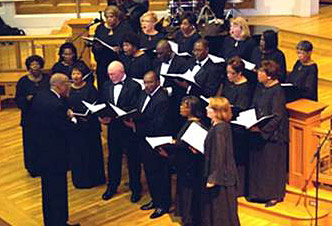In February of next year, The Sound of the Northwest gospel choir of Seattle travels to Carnegie Hall in New York City for the biggest performance in their long history. To help pay the cost they're holding their first major fundraiser, Sunday, Oct. 16 at 4 p.m. at the Seattle First Baptist Church, 1111 Harvard Ave. Special guest is poet Dr. Gloria Burgess. The Skanner News spoke with Juan Huey-Ray, The Sound's director and founder, about the choir's upcoming concert, their vision and long-range plans.
 The Skanner News: What does it mean for your group that you're having this opportunity?
The Skanner News: What does it mean for your group that you're having this opportunity?
Juan Huey-Ray: Oh wow. We were shocked. What a way to start out your 25th anniversary year. So it means the world to us in that it puts us at another level. We've been a community chorus for 24 years now; we will continue to be. But we will be doing more with respect to music in terms of helping people to understand and connect with it. As we have been a performing group in the past, we will now expand our teaching. Because we believe the spiritual has to endure whatever they're confronted with in life. That's demonstrated because of enslaved Africans who – we're here because they were able to endure. The music that poured out of their souls can be refreshing and reviving for people today.
TSN: So then will there be a recording made of the show?
Huey-Ray: There will be a recording in fact, in January. It will be available in February when we get back. It would not be recorded in Carnegie Hall, they will not allow that.
TSN: Talk a little about your vision of which musical selections you'll be performing.
Huey-Ray: Good question. We have 25 minutes onstage by ourselves so we've selected seven numbers and they kind of run the gamut. There's one that is a Christmas spiritual, although most people don't think of it as such, "Children Go Where I Send Thee." There's one, "My Soul Has Been Anchored in the Lord," by Moses Hogan; the message speaks for itself. There's an original by one of our members, Cora Jackson, called "Wouldn't Take Nothing for My Journey," which is something that you often hear from our elders in church, that they've been through hard times but they say, 'I wouldn't take nothing for my journey.'
And "Lift Ev'ry Voice and Sing," what many people call the Negro National Anthem. It's actually the Negro National Hymn. But be that as it may it's a great piece, and we open the program with that one. "Even Me" takes us back to the point in time when the enslaved ones would say, 'pass me not oh gentle savior, lord I hear of showers of blessings, so while all that's going on would you send some my way please?'
"Soon I Will be Done" is an arrangement that I've done which refers to the enslaved ones looking forward to a day when they no longer were confronted by the kind of things they were going through on a daily basis. Back in those days death was the portal, if you will, to a better life, and that's what the song is essentially about. Today people resort to drugs and alcohol and suicide and all those kinds of things because they can't cope with the pressures of life. The enslaved Africans didn't have all that at their disposal. All they had was hope and faith. And they survived.
TSN: In what ways can we in the community support your work?
Huey-Ray: For the purpose of this trip, funds are needed. You don't get paid to go to Carnegie Hall. Not all of our 50 people are able to pay the total cost. Every one has raised funds, and at this point we have raised over $25,000 toward that total cost. So donations are certainly needed. Although the concert is in February we have to have all the funds raised by Dec. 15. They can go to our website at http://www.culturalpursuits.org to make donations there, and on Facebook.
TSN: Talk about your longer-term vision of starting an educational institution.
Huey-Ray: We want to launch an academy that teaches the three "r's" – readin', writin' and 'rithmetic, as the old folks used to say, and we're going to do it using the Negro spiritual. Because you've got to count in music. And there is so much to the Negro spiritual that is overlooked, people tend to think about the religious aspects of it, but if you stopped to think – we're talking about people who were brought here who did not speak English. So there's a whole linguistic side of this that has never been approached. How did they communicate amongst themselves? How did the music take root in enslaved populations? There are so many legends about spirituals having double meanings and messages coded into them – but how did that get disseminated, if you will? So there's history to be learned from the study of the Negro spiritual. There's mathematics to be learned from the study of the spiritual; linguistics to be learned. There are all kinds of things that are useful today, in addition to the hope that these songs inspired.
The Sound of the Northwest performs, "Views from the Past, Hope for the Future," Sunday, Oct. 16 at 4 p.m., at Seattle First Baptist Church, 1111 Harvard Ave., Youths ages 17 and under are free, seniors (60+) are $15. General admission tickets are $25.
Purchase tickets at http://www.brownpapertickets.com or go to http://www.culturalpursuits.org For more information call 425-687-3190.
- Home
- News
- Opinion
- Entertainment
- Classified
- About Us
 MLK Breakfast
MLK Breakfast- Community
- Foundation
- Obituaries
- Donate
04-23-2024 12:56 am • PDX and SEA Weather






















































































































































































































































































































